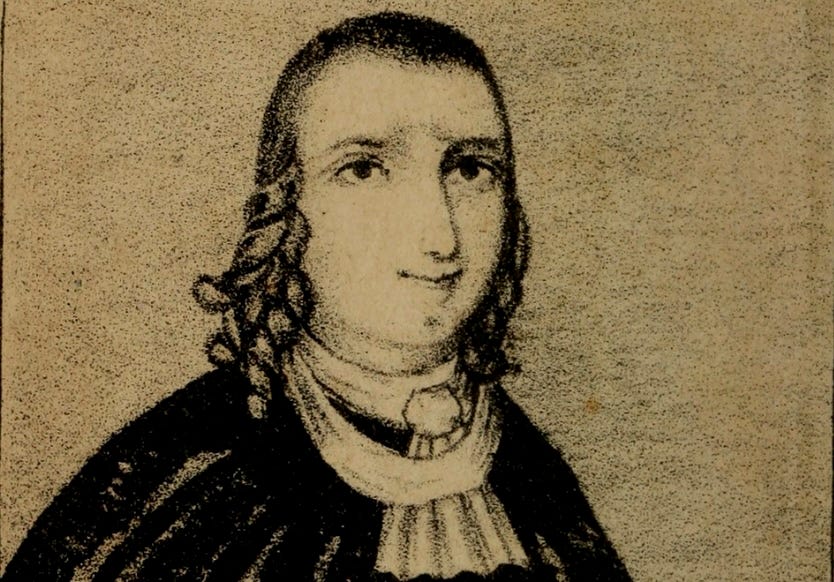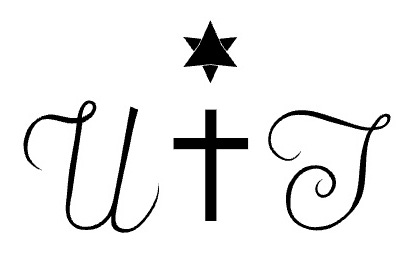American History Corner: The Enby-Maybe-Messiah, The Publick Universal Friend!
Another fascinating colonial tale!

For Thanksgiving week, how about another tale of a nonbinary colonial person, the first colonist born on American soil to found their own religion?
Jemima Wilkinson was born on a cherry farm in 1756 as a girl, the eighth child of Quaker parents. She was steeped in Quaker theology, but after some of her brothers got kicked out of Quaker meeting for training for military service and her sister was kicked out for having an illegitimate child, Wilkinson began dabbling in the teachings of the New Light Baptists, who had more of an individualistic bent. Then at at 24, Wilkinson had an illness, probably typhus from a navy ship that had recently come into port. After days of fever she either almost died and recovered with a different personality, or she did die and was resurrected as a genderless spirit, called the “Publick Universal Friend.”
Either way, the person formerly known as Jemima woke up and said they had a vision of going to heaven and getting a revelation from two archangels, who tooted horns and proclaimed, "Room, Room, Room, in the many Mansions of eternal glory for Thee and for everyone.” They:
“droppt the dying flesh & yielded up the Ghost. And according to the declaration of the Angels, the Spirit took full possession of the Body it now animates.”
And from then on, for the rest of their life, they refused to be called by the dead name, and only answered to "the Friend" or “PUF” for short. Just three days after recovering from the illness/resurrecting, The Friend started preaching, railing against slavery, drinking alcohol, dipping snuff, and lacing one’s dress too tight, promoting celibacy, and foretelling fiery apocalyptic wrath when the end of the world came in 1780. And they preached that women should be obedient to God, not their husbands.
From evil practices abstain, and every other sin.
From drinking whiskey, brandy, rum likewise from Holland gin.
For it will make a rich man poor, an honest man a knave.
It will lay the rider in the ditch, The drunkard in his grave.
Old woman next to you I call Now take a friend's advise [sic]
Lay by your snuff case one and all
And throw away your pipes.
Your upper lip is always dubed
Your nose is tinged with red
You take a pinch in either hand
Then go to mixing bread.
Intemperance often shows itself
In dress as well as drink.
Young ladies this you know is true
And from it you should shrink.
But lacing tight is worse than all
Beware of such a curse
It injures health, produces death
Oh what can there be worse.
And they got a really neat looking seal:
The Quakers had female preachers, even traveling ones, and were not against people claiming to have a vision or two, but they could not tolerate that The Friend was commingling with the New Light Baptists, and kicked them out of meeting.
So they got together 23 disciples, mostly unmarried women, and they called themselves the Society of Universal Friends, basing their beliefs on Quaker theology but with a side of visions, prophecies and Godly feminism. The group invested in a plot of land in Genecca (Genesee) County in 1788, and at its peak 260 people were living there, mostly in single-female-headed households, with some adherents also taking up up androgynous dressing.
And The Friend kept to itinerant preaching around the North Atlantic colonies, where they collected new followers and also attracted attention, suspicion and accusations of of blasphemy: while The Friend would not claim they were the messiah, they wouldn’t deny it, either.
In Roxbury they were stoned and thrown out of town, and in Philadelphia, a mob attacked the meetinghouse where they were preaching with “stones & brickbats.” Prurient rumors spread, such as that the right-hand woman she traveled with was actually a man dressed as a woman.
“There are some among us who appear to believe that she was something more than human—the messenger of truth, divinely sent! Others paint her as a downright devil in petticoats—artful, abandoned, libidinous, and wicked,” noted Philadelphia’s National Intelligencer. (No one but The Friend’s followers seems to have respected their pronouns.)
Back on their plot of land, the Society made up the largest non-Native community in western New York. They lived in peace with the recently-displaced Seneca, interceded for the natives with the colonial government, and built a self-sustaining community with a grist mill, saw mill and everything. It didn’t last long, though, speculators bought the land out from under them and they were forced to move, buying land from the Iroquois Confederacy and relocating to Jerusalem, a town in Yates County, New York.
But the peace didn’t last, in 1799 a magistrate judge riled up by some disillusioned followers attempted to arrest The PUF for blasphemy. But The Friend was a skilled horse-person and outrode them. Then an officer and an assistant returned to the homestead and tried to arrest The Friend, but the group of fired-up unmarried women attacked the men and tore their clothes off, which sounds like quite a scene.
The men retreated, then returned with a posse of about 30, breaking down the door with an ax, and threatening to haul The Friend away in an ox-cart to face trial. A deal was made for the PUF to appear in court, and they did. The judge ruled that blasphemy was not a crime, and even invited The Friend to give a sermon in court, not very separation-of-church-and-state. And The Friend went back to their land and traveling-preaching for another 20 years. The group lived communally, helped tend to soldiers in the Revolutionary War, and the world did not end in 1780.
After The Friend died in 1819, at age 67, the group did not last much longer, which a baked-in problem when you encourage celibacy. Though many other similar American attempted-utopia communities came after, perhaps somewhat inspired. Today the Publick Universal Friend and their lawman-and-gender-stereotype fighting community has been largely forgotten, but sounds like a good time while it lasted.
Happy Thanksgiving everybody!
[Larson, Scott, “‘Indescribable Being’: Theological Performances of Genderlessness in the Society of the Publick Universal Friend, 1776–1819.” Early American Studies 12, no. 3 (2014): 576–600
Hudson, David, “Memoir of Jemima Wilkinson, a preacheress of the eighteenth century; containing an authentic narrative of her life and character, and of the rise, progress and conclusion of her ministry,” Richardson and Dow, 1844]




The movie post is up, tonight we are watching Nazis get punched and faces melted. It's 𝐑𝐚𝐢𝐝𝐞𝐫𝐬 𝐎𝐟 𝐓𝐡𝐞 𝐋𝐨𝐬𝐭 𝐀𝐫𝐤
Speaking about Friends . . .
Many years ago, the synagogue in a small town burned down.
In a gesture of interreligious good will, the local Society of Friends offered the Jewish congregation temporary use of their meeting house.
This turned out to be a good fit, since the Quakers didn't hold services on Friday nights or Saturday mornings, and their plain decor did not include crosses.
After a while, some members of the Jewish congregation became curious about Quaker meetings, and started to attend them. Eventually, several of them became Quakers.
Many years passed. A Jewish family from a large city was considering whether to move to the community. They met with the small town's Rabbi to discuss the prospect. The couple asked the Rabbi if the town had an active Jewish population. The Rabbi sighed. "Years ago, we used to have an engaged, vital Jewish community. But that was in the past."
The Rabbi shook his head sadly. "Now, some of my best Jews are Friends."
*
Okay, I'm back from my Thanksgiving hiatus.